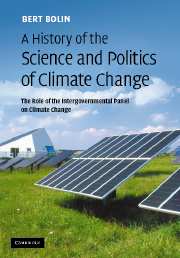 A History of the Science and Politics of Climate Change
A History of the Science and Politics of Climate Change Book contents
- Frontmatter
- Contents
- Foreword by Bo Kjellén
- Abbreviations
- Part I The early history of the climate change issue
- Part II The climate change issue becomes one of global concern
- 5 Setting the stage
- 6 The scientific basis for a climate convention
- 7 Serving the Intergovernmental Negotiating Committee
- 8 The IPCC second assessment report
- 9 In the aftermath of the IPCC second assessment
- 10 The Kyoto Protocol is agreed and a third assessment begun
- 11 A decade of hesitance and slow progress
- Part III Are we at a turning point in addressing climate change?
- Some concluding remarks
- Notes
- References
- Name index
- Subject index
8 - The IPCC second assessment report
Published online by Cambridge University Press: 03 May 2010
- Frontmatter
- Contents
- Foreword by Bo Kjellén
- Abbreviations
- Part I The early history of the climate change issue
- Part II The climate change issue becomes one of global concern
- 5 Setting the stage
- 6 The scientific basis for a climate convention
- 7 Serving the Intergovernmental Negotiating Committee
- 8 The IPCC second assessment report
- 9 In the aftermath of the IPCC second assessment
- 10 The Kyoto Protocol is agreed and a third assessment begun
- 11 A decade of hesitance and slow progress
- Part III Are we at a turning point in addressing climate change?
- Some concluding remarks
- Notes
- References
- Name index
- Subject index
Summary
The polarisation of the views on the reliability and adequacy of the scientific and technical knowledge base increase.
First party conference of the FCCC
It is important first of all to make clear that the Climate Convention that came into force in 1994 is a framework convention that primarily specifies the procedures to follow and agreements on the general structure of the intergovernmental arrangements required in order to deal with the climate change issue. It does not specify any quantitative and binding commitments for the parties, but regulates the important matter of establishing a reporting system between countries and the Convention secretariat. Two prime tasks for the first conference of the parties in Berlin in March–April 1995 were accordingly to elect chairpersons and members of committees to be set up, and to formulate the goals for the negotiations between countries during the next few years, i.e. the ‘Berlin mandate’. As chairman of the IPCC I was also anxious to get a clear idea about the forthcoming interplay between the IPCC and the SBSTA which was to be formed by the Convention.
The upcoming first conference of the parties stimulated discussion in wider circles of the assessments carried out so far by the IPCC, and the process for the assessment that IPCC had developed. There would obviously be more publicity about the climate change issue and also the IPCC during coming months. I was going to give a presentation at the UN at the beginning of February and it was decided that I would then spend a few days in Washington DC, and thereby become more acquainted with representatives of the US press.
- Type
- Chapter
- Information
- A History of the Science and Politics of Climate ChangeThe Role of the Intergovernmental Panel on Climate Change, pp. 106 - 124Publisher: Cambridge University PressPrint publication year: 2007
- 2
- Cited by
